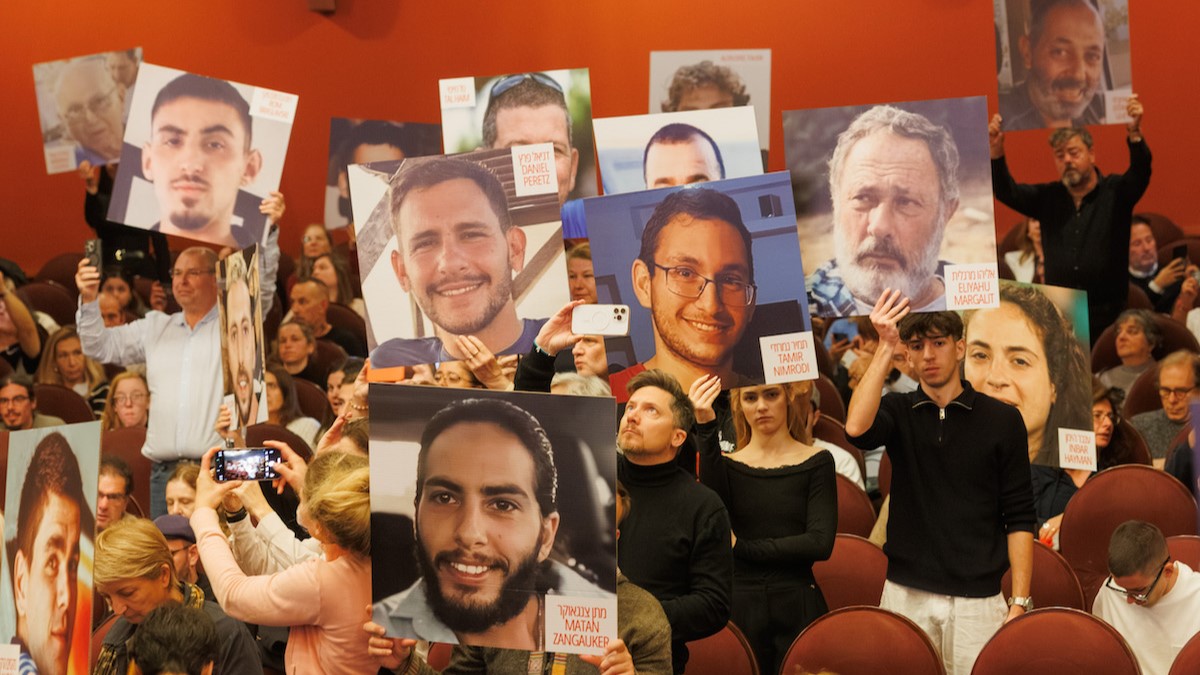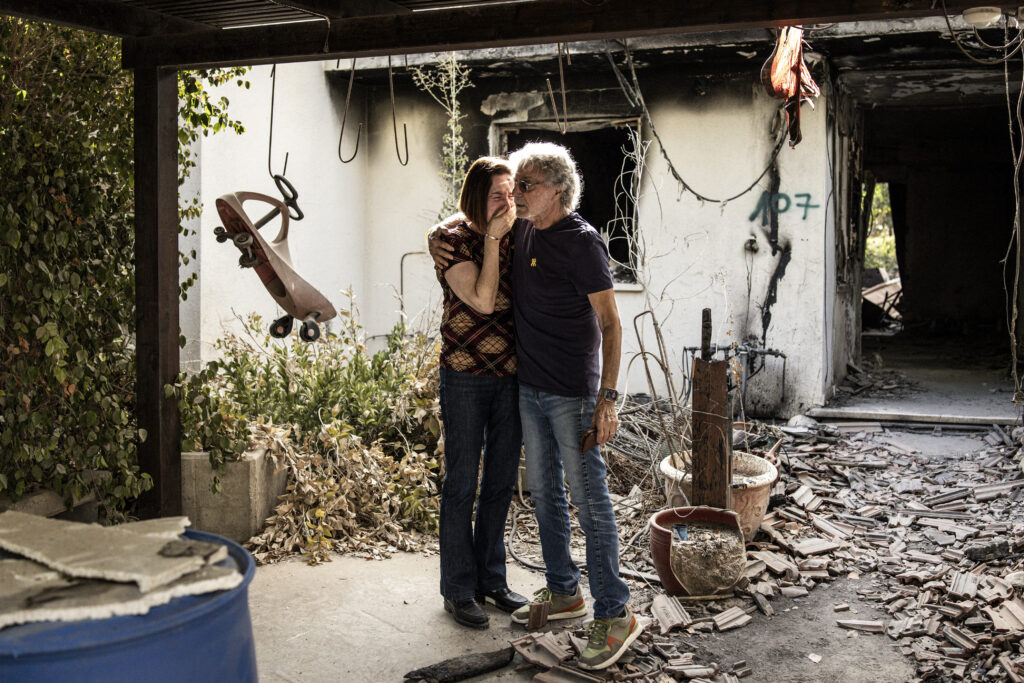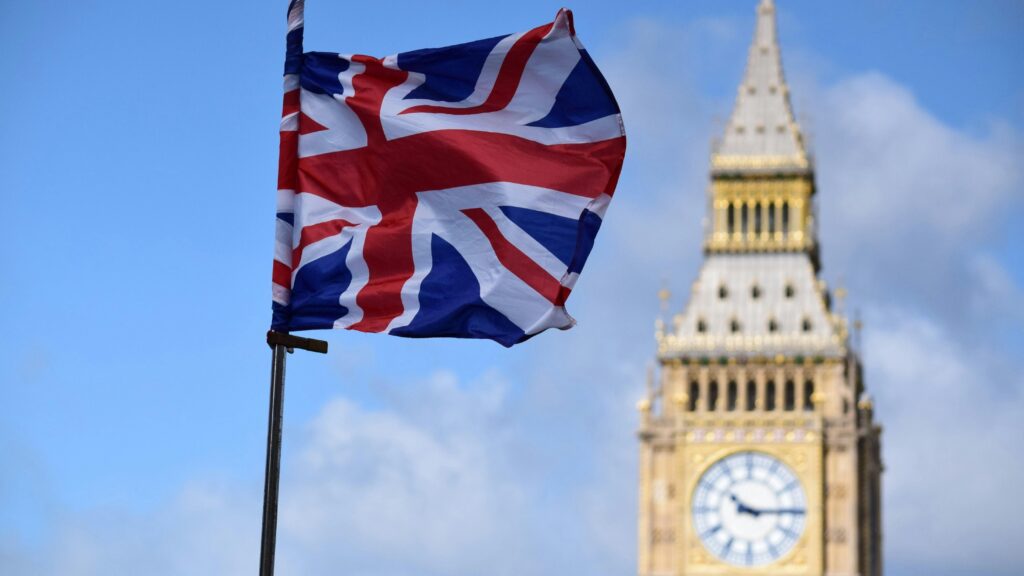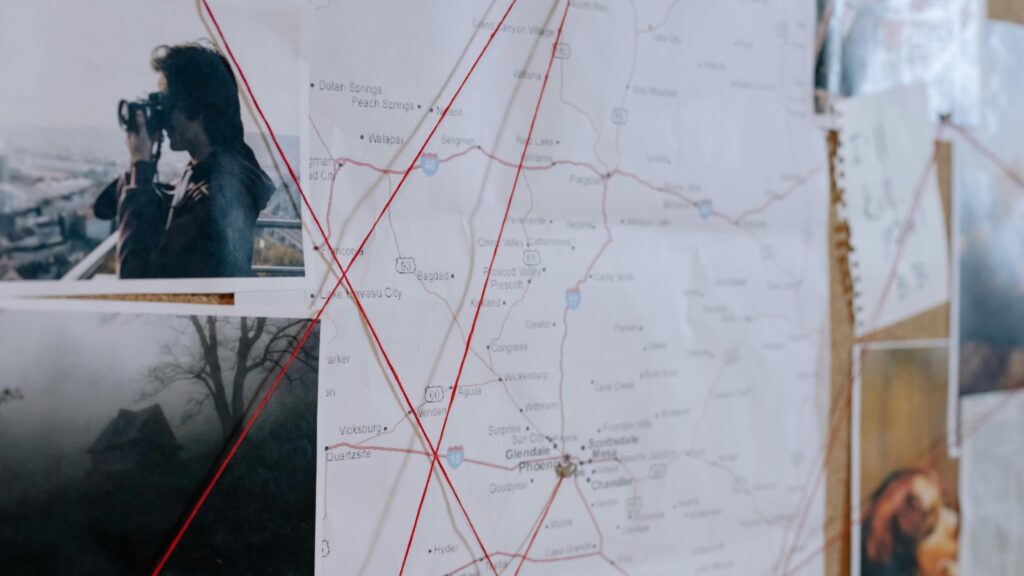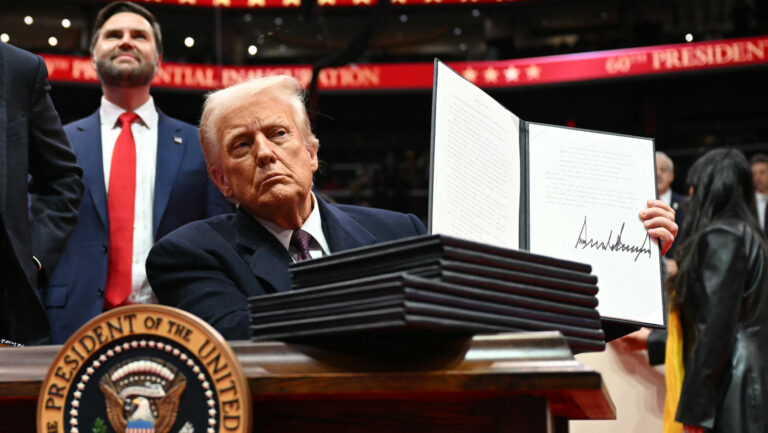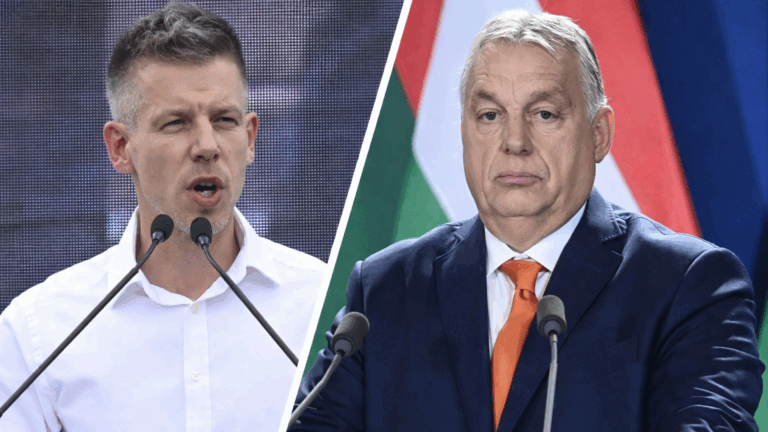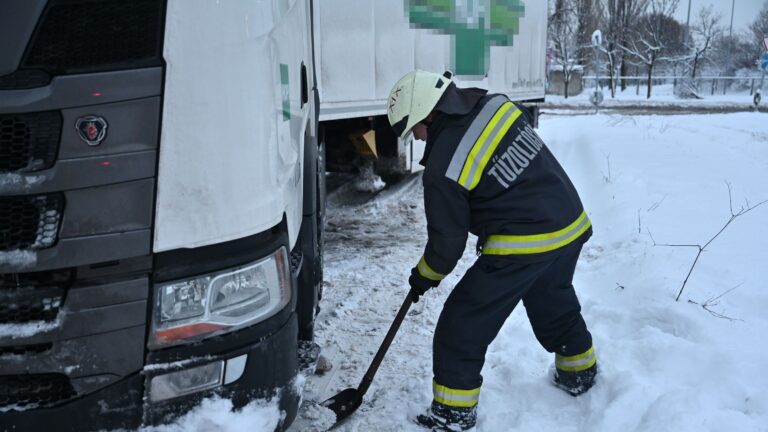Two years after the Hamas massacre of 7 October 2023, Hungary’s Jewish community and its supporters gathered to mourn, remember, and reaffirm life.
Organized by the Hungarian Jewish Community Forum (Kidma) and Keren Hayesod, in cooperation with the Federation of Hungarian Jewish Communities (MAZSIHISZ) and the Embassy of the State of Israel in Hungary, the commemoration took place in the Ceremonial Hall of the Uránia National Film Theatre in Budapest.
Before the screening of Yariv Mozer’s Emmy Award-winning documentary We Will Dance Again, participants read aloud the names of the 48 hostages still held by Hamas. Their names echoed through the theatre, followed by a minute of silence in memory of the 1,200 people murdered on that black day two years ago.
The solemn evening was attended by János Bóka, Minister for European Union Affairs and the Prime Minister’s Special Envoy for Combating Antisemitism; Moran Birman, Deputy Ambassador of Israel to Hungary; and Prof Dr Andor Grósz, President of Mazsihisz. More than 400 people stood together in remembrance and solidarity.
‘the most serious pogrom in Israel’s modern history’
‘Two years have passed since 7 October 2023, when the Hamas terrorist organisation launched the most serious pogrom in Israel’s modern history,’ said Dr Eszter Dolinay, curator of the Keren Hayesod Foundation. ‘A total of 1,200 people of different religions and nationalities were murdered, and 251 hostages were dragged into Gaza, where many are still being held in inhumane conditions.’
‘Their names echoed through the theatre, followed by a minute of silence in memory of the 1,200 people murdered’
The first part of the evening featured a short film in which community members folded symbolic paper butterflies, expressing compassion and hope for the hostages. The ceremony also paid tribute to the victims of the recent Manchester synagogue attack—Adrian Daulby (53) and Melvin Cravitz (66).
The artistic programme included the song Szíved, ha szakad (Your Heart, If It Breaks), composed by Nelli Teszter and Gergely Nógrádi, followed by Al Kol Eleh and Kol Ha’olam Kulo. Then, one by one, participants read the names of those still in captivity while their faces appeared on screen—a poignant reminder of families torn apart.
‘unbreakable promise: we will dance again’
The documentary We Will Dance Again, winner of the Outstanding Current Affairs Documentary at the 2025 News and Documentary Emmy Awards, tells the stories of young survivors of the Nova Music Festival—one of the first targets of the Hamas attack on 7 October 2023.
The Nova Festival was meant to be a celebration of life, love, and music—a gathering of thousands of young people dancing freely under the desert sky. But that celebration became one of the first sites of horror when Hamas launched the deadliest terrorist assault in Israel’s history.
We Will Dance Again weaves together the gripping testimonies of more than a dozen festival-goers, recounting minute by minute how they survived. Their accounts are interlaced with footage they filmed themselves—sometimes to help authorities later identify victims, sometimes to document their final moments (or what they thought would be their last moments) for their loved ones, and sometimes simply to bear witness. The film also includes chilling scenes recovered from body cameras worn by Hamas fighters, revealing not only their barbarity but also their pride in recording their atrocities.
Though We Will Dance Again is deeply emotional and often harrowing, it ultimately delivers a message of unity, friendship, and the enduring strength of the human spirit. It stands as a tribute to the young souls who survived—and became symbols of resilience.
On Friday, 6 October 2023, thousands gathered at the Nova Music Festival to celebrate love, music, and life itself. But at 6:29am the next morning, the joy was shattered. A barrage of rockets sliced through the dawn sky, and laughter turned to screams. The peaceful celebration was violently interrupted as hundreds of armed terrorists stormed the grounds. Nearly 10 per cent of those present—411 people—were murdered, and 43 were taken hostage.
Another haunting aspect shown in the documentary is how unprepared the festival-goers were. Many were intoxicated or in a euphoric state of mind, suddenly forced to make life-and-death decisions in seconds of incomprehensible chaos. What began as a festival of light and love descended into unimaginable darkness. Innocence fell alongside the music—but from that devastation emerged resilience, courage, and the unbreakable promise: we will dance again.
‘like passing through hell itself or even worse’: Experiences of Hungarian Nova Survivors
After the screening, journalist Judit Kárpáti spoke with M Dorina, a Hungarian survivor of the Nova Festival who is neither Jewish nor Israeli—yet the brutal attack spared no one.
Dorina had travelled to Israel to attend her best friend Annamária’s wedding to her fiancé Amit T. Two days after the ceremony, they joined the Nova Festival to celebrate. When the Hamas assault began, they narrowly escaped tragedy: they ignored police instructions to head toward the Re’im base—one of the first sites overrun by terrorists—and, following Amit’s instincts, they instead drove in the opposite direction. Their car came under heavy fire, bullets striking the vehicle repeatedly, but miraculously, they reached another army base, where they hid for over half a day in a small room crammed with 14 people.
‘We Will Dance Again…stands as a tribute to the young souls who survived—and became symbols of resilience’
The group remained in absolute silence while IDF soldiers fought to retake the base, which had been temporarily seized by Hamas. At one point, terrorists tried to break into the building, throwing grenades and firing at doors, but they never entered the room where Dorina and the others were hiding. Even after the IDF regained control, they could not leave until 2am, when soldiers finally escorted them out. For another two hours, they had to drive home through the scenes of massacre, with rockets still streaking across the sky, which was—as Amit later told Szabad Európa— ‘like passing through hell itself or even worse. You can’t even imagine it.’
Yet their story did not end in tragedy. Since that day, Annamária and Amit—who both survived—have welcomed a baby into their family, beautifully symbolizing new life after devastation.
Before the attack, Dorina felt safe in her ‘Hungarian bubble’, never having faced anything like war or terror. After 7 October, her perspective changed completely. For months, she was unable to speak about what she had endured. Professional therapy helped her begin to process the trauma and eventually to share her story.
Amit, reflecting on his own experience and the lessons from his Holocaust survivor grandparents, said he learned to love life even in the face of evil. ‘7 October felt like being dropped into a Call of Duty video game—but without weapons,’ he said. ‘We were civilians trying to escape a battlefield.’
When asked how such an attack could happen despite Israel’s strong military, Amit replied: ‘We know the answer, but this is not yet the time to speak. When all the hostages return and Israel begins to heal, then we can start asking questions. For now, the war is still ongoing, and recovery feels far away.’
He added that many Israelis are struggling deeply—some taking their own lives, others facing hostility abroad. ‘I don’t feel safe in many European cities anymore,’ he admitted. ‘I often have to hide my Israeli identity. I’ve become the enemy.’
Yet, despite all this pain, Amit insisted that Israel’s struggle is not one of choice but of survival. ‘No Israeli wants to be in Gaza,’ he said. ‘But 7 October left us with a “now or never” moment. We don’t want to kill innocents; we don’t want this war. But we were forced into it.’
Quoting former Israeli Prime Minister Golda Meir, he concluded: ‘Peace will come when the Arabs love their children more than they hate us.’
From Auschwitz to Jerusalem: The Unbroken Thread of Jewish Hope
For many, the tragedy of 7 October awakened painful echoes of earlier horrors in Jewish history.
In 2018 I had the opportunity to take part in the annual March of the Living at Auschwitz with my school—an experience I will never forget. During our two-day journey, as Reuven Rivlin, the tenth President of Israel, said in his memorial speech, ‘We marched from death to life. From the Holocaust to rebirth. From Auschwitz to Jerusalem.’
‘7 October felt like being dropped into a Call of Duty video game…We were civilians trying to escape a battlefield’
I vividly remember that first visit to Auschwitz: walking through the grounds where one of history’s darkest and most brutal genocides took place. The weight of it was so unbearable that we felt physically sick at the thought of returning the next day for the march. That visceral sickness—the confrontation with the raw reality of hatred—echoed in me last year, when I stood at the site of the Nova Music Festival massacre, and on 5 October this year, when I watched We Will Dance Again.
The film’s footage, much of it filmed by the perpetrators themselves, revealed a level of cruelty that defies comprehension. It reminded me that the antisemitism that fueled Auschwitz has not vanished—it has only changed form.
Yet, as Amit said in response to the idea that Jews are ‘victims’ once again after the Holocaust:
‘I wouldn’t use the word “victim”. If we look at what Israel has achieved since the Holocaust—what it has built in just 70 years—not many nations could have done that in such a short time. We moved on from what the Nazis did to us and looked toward the future—and we are still doing that today.’
When, in 2018, I returned to Auschwitz the next day for the March of the Living, the atmosphere was transformed. The same camp that had witnessed industrial-scale death was suddenly filled with life and hope. 12,000 people—young and old—walked together to remember the victims and to celebrate that life had triumphed over death, that the Nazis’ ‘final solution’ had failed.
One of the most cathartic moments came as we left the camp and the anthem of Israel, Hatikvah—which means The Hope in Hebrew—rose into the air. Standing there, hearing The Hope resonate through the place that once symbolized total despair, I understood in a new way the unbroken thread connecting Auschwitz to Jerusalem: the eternal, unyielding hope of the Jewish people.
‘New day will rise, life will go on…Darkness will fade, all the pain will go by’
As a Holocaust survivor close to me once said:
‘It must always be borne in mind that the genocide of the Jewish people can happen again, for such horrors come unexpectedly. Now that we know this can happen, we must pay attention much sooner to everything that is hate and racism. We must be aware of what is happening in the world, and we must not simply hope that things will go well on their own.’
When I visited Auschwitz, the only thing that kept me going after confronting one of the darkest places in human history was the realization that, despite living under the constant threat of terrorism, the Jewish people of Israel remain unbreakably resilient, optimistic, and grateful. Never could I have imagined that so soon after my visit to Auschwitz, we would once again witness such horrific brutality and the deadliest day for the Jewish people since the Holocaust.
Yet, as Yuval Raphael—a Nova festival survivor herself who represented Israel at the 2025 Eurovision Song Contest with her song New Day Will Rise—sang:
‘New day will rise, life will go on
Everyone cries, don’t cry alone
Darkness will fade, all the pain will go by
But we will stay, even if you say goodbye.’
Even though life goes on, we will always remember those whose lives were brutally taken on 7 October. The resilience of those who survived and chose to live on is a living testament to the triumph of life over death, of a 2,000-year-old hope over hatred: that the Jewish people may live as a free nation in their own land—the Land of Zion and Jerusalem. The hope expressed in their national anthem, Hatikvah, was finally realized 77 years ago when the Jewish people regained the ability to defend themselves.
May the memory of the victims of 7 October forever be a blessing.
The trailer of the We Will Dance Again documentary can be watched here:
We Will Dance Again | Paramount+ Official Trailer
The Tribe of Nova music festival was supposed to be a celebration of life, love and music for thousands of young people, but the gathering became one of the first targets of Hamas’ deadliest terror attack in Israel’s history.
Yuval Raphael’s performance of New Day Will Rise at the Eurovision festival can be watched here:
Yuval Raphael – New Day Will Rise (LIVE) | Israel 🇮🇱 | Grand Final | Eurovision 2025
Subscribe and 🔔 to Eurovision 👉 https://www.youtube.com/user/eurovision?sub_confirmation=1 Yuval Raphael from Israel performed New Day Will Rise in the Grand Final of Eurovision 2025 in Basel, Switzerland ~~~ Lyrics ~~~ New Day Will Rise And even if you say goodbye You’ll never go away You are the rainbow of my
Related articles:

